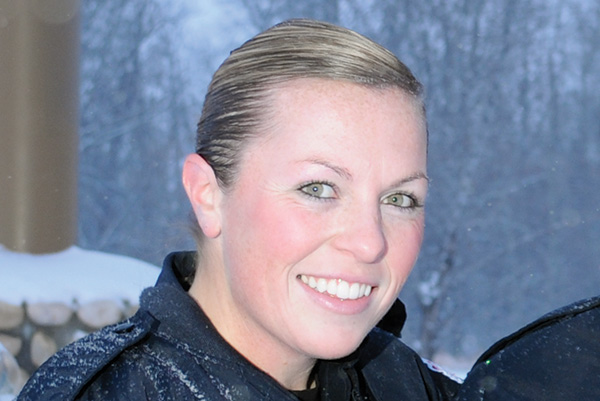Are you ready to make a difference in your community? Prepare for a career serving others and working collaboratively to ensure our communities are safe, healthy and vibrant in our Criminal Justice – Policing program. In our two-year Criminal Justice – Policing program, you’ll gain insight into the criminal justice system, including procedural law, and you will build the competencies that public safety agencies are looking for in successful applicants. Through many experiential learning opportunities, you’ll have the opportunity to apply theory and your knowledge in our specialized learning spaces.
Sharing a common first year with students in the Criminal Justice - Corrections diploma, the crucial skills you will learn to develop include teamwork, ethical accountability and responsibility, written and verbal communication, and problem-solving skills. In your second year, you will develop key competencies in the areas of interpersonal conflict resolution, emotional intelligence, and self-confidence which are essential qualities required for a career in public safety.
Dual Diploma Option
Students pursuing Criminal Justice – Policing or Criminal Justice - Corrections diplomas with the School of Justice share a common first year of courses. The common first year design of our justice programming facilitates opportunities for you to start your journey in public safety together with students from the Criminal Justice - Corrections diploma. Together, you’ll exchange ideas and beliefs, and have an inclusive educational experience that will strengthen relationships and understandings of all branches within the public safety field. Additionally, all students will have the opportunity to learn the ethical framework that should guide the actions of all public safety professionals. The common first year also enables students to take one extra semester to earn a second diploma from the School of Justice Studies at Lethbridge College.
Apply Now Grab and Go InformationCareer Opportunities
You'll leave our program with a comprehensive understanding of the criminal justice system and a valuable range of practical skills and abilities. You'll be ready to do justice, as either a sworn public safety officer or as a civilian employee, with:
- Emergency Services
- Federal Enforcement Agencies such as Royal Canadian Mounted Police, Canada Border Services, Correctional Service Canada, CSIS
- Municipal Police Services
- Private Security and Investigation Agencies
- Provincial Enforcement and Protection Services including Sheriffs
- Provincial Police Services
- Regional Police Services
Visit ALIS website for more career information.
50+ years
of delivering quality public safety education
4 state-of-the-art learning spaces:
courtroom, crisis apartment, conflict resolution simulators and interviewing rooms
2 diplomas
can be earned in just over two years with our common first year for Criminal Justice – Policing and Criminal Justice - Corrections programs
At-a-Glance
Starts-in
September (on-campus and online), January and May (online only)
Credential / Accreditation
Diploma
Duration
2 years
Dates and Deadlines
Visit the Program Application Status page for more details.
Academic Centre
Program Availability
Admissions
This program is available for International Students.
New applicants are accepted into the Criminal Justice - Policing program in the Fall (September) term for on-campus and online study. Students can also start in the Winter (January) or Spring (May) term for online study.
General Admissions Requirements
All applicants must meet the general admission requirements for Lethbridge College programs, as indicated in the Admission section of this calendar.
Non-Academic Requirements
Applicants are required to review and acknowledge completion of an online information package relating to the entry/suitability requirements for a career in Public Safety.
Medical Requirements
Although no physical requirements are placed on applicants for entry to the program, applicants should ensure through a medical examination that their cardio-vascular system is suitable to undertake strenuous fitness related exercise. In addition, applicants are advised to undergo eyesight/colour vision testing for compatibility with the requirements of potential future employers.
Upon successful completion of all program requirements, students are awarded a Criminal Justice - Policing diploma.
Note: Employing agencies have additional hiring requirements such as vision standards, hearing standards, a valid driver’s license, Standard First Aid and CPR. Learners are strongly encouraged to know the vision and hearing standards and to obtain and maintain their credentials in First Aid and CPR to ensure employment qualifications are met.
Athabasca University
Graduates of Lethbridge College's Criminal Justice - Policing diploma are eligible to receive up to 60 credits towards Athabasca University's Bachelor of Professional Arts (BPA) in Human Services or Bachelor of Professional Arts (BPA) in Criminal Justice.
Lethbridge College
Graduates of Lethbridge College's Criminal Justice - Policing diploma may choose to enter the Bachelor of Applied Arts in Justice Studies program at Lethbridge College. Courses are provided on campus or through Online Learning.
Royal Roads University
Graduates of Lethbridge College's Criminal Justice - Policing diploma with a GPA of 3.0 or higher are eligible for full block transfer into the third year of the Bachelor of Arts in Justice Studies at Royal Roads University. For more information, please visit https://www.royalroads.ca
Work-Integrated Learning (WIL) Pre-Placement Requirements
This program has a required Work-Integrated Learning Pre-Placement Requirements (WIL) component. The College dictates the legal terms and conditions governing the WIL.
Students must meet and maintain certain requirements to participate in the WIL setting as determined by programs, practice agencies and/or legislated by government bodies. These may include health (e.g. immunizations, screening tests, etc.), privacy and security (e.g. police information check, IT access, etc.), and OH&S requirements (e.g. CPR certification, Fire Safety, WHMIS, Mask Fit-testing, etc.).
Workers' Compensation Board (WCB) coverage - WIL placement agencies and employers usually require WCB coverage on behalf of the student. Students enrolled in post-secondary institutions in Alberta are deemed to be employees of the Province of Alberta and, as such, provided WCB coverage. In certain instances for students outside of Alberta, WCB coverage may not be provided (e.g. non-Alberta residents taking a course solely through distance learning with a WIL placement outside of Alberta). These students are advised to contact the program prior to application.
Students with disabilities who may require accommodations must schedule an appointment with Accessibility Services at Lethbridge College preferably upon acceptance to the program and no later than the Add/Drop deadline to identify potential impacts of their disabilities in the WIL setting. As part of this process, it may be necessary to collaborate with WIL supervisors to determine appropriate accommodations that do not compromise the health and safety of clients, essential placement requirements, or mandatory licensing processes. Failure to consult with Accessibility Services in a timely fashion may compromise the student's WIL placement and opportunities for success in the WIL setting.
In order to participate in a WIL, a student may be required to complete a Police Information Check or other type of Security Clearance to the satisfaction of Lethbridge College and the WIL organization. Completion of a WIL does not guarantee employment with a WIL organization. Many disciplines are provincially or otherwise regulated (e.g. health professions under Alberta's Health Professions Act); such regulation is beyond Lethbridge College's control. Completion of a WIL and graduation from a certain program do not guarantee one's licensure or admission into a regulatory body. Prospective students are encouraged to consult with a representative of the relevant regulatory body if they have concerns.
WIL sites may include Lethbridge, surrounding rural communities, and may extend beyond these boundaries depending on WIL site availability and approvals. WIL’s may include day, evening, and/or weekend schedules. Students will be expected to travel to assigned sites and will be responsible for arranging travel and any associated costs.
Take a Viewbook
Need more information about Lethbridge College? Browse our viewbook for more details about programs, awards and scholarships, student life and more!
Download viewbook

Delivery Formats
The Criminal Justice – Policing program is available through on-campus delivery, which may include some blended delivery components, as well as a fully online delivery.
Blended
This program includes both face-to-face/on-campus and online delivery in both synchronous (learning occurs in real-time on a set schedule) and asynchronous (learning does not occur at the same time or same place) formats.
On Campus
This program is delivered in a face-to-face format on the main Lethbridge College campus. Lectures, labs and hands-on training opportunities will all take place on campus in Lethbridge.
Online – Asynchronous
This program is offered in an online asynchronous format meaning learning does not occur at the same time or same place. Instructors provide materials for online completion, including online readings, recorded lectures or presentations, posted lecture notes, video content, assignments and exams. Students access course materials within a flexible timeframe prescribed by the instructor.
Courses
| Course | Title | Credits |
|---|---|---|
| Year 1 | ||
| Term I | ||
| CJP-1159 | Ethics and Critical Thought | 3 |
| CJP-1160 | Introduction to Criminal Justice System | 3 |
| COM-1165 | Public Safety Communications/Interpersonal Relations | 3 |
| ENG-1150 | Composition | 3 |
| LAW-1177 | Procedural Law in Canada | 3 |
| PSY-1160 | Introduction to Psychology | 3 |
| Credits | 18 | |
| Term II | ||
| CJP-1157 | Preliminary Response and Investigation | 3 |
| CJP-1177 | Applied English & Public Safety Writing | 3 |
| CJP-1185 | Diverse Populations in Public Safety | 3 |
| COR-1180 | Youth in the Justice System | 3 |
| LAW-1178 | Criminal and Correctional Offences | 3 |
| SOC-1160 | Introduction to Sociology | 3 |
| Credits | 18 | |
| Year 2 | ||
| Term I | ||
| CJP-2281 | Conflict Management | 3 |
| CJP-2289 | Investigative Techniques | 3 |
| LAW-2254 | Applied Law | 3 |
| PED-1190 | Fitness & Lifestyles in Public Safety I | 3 |
| SOC-2290 | Addictions and Mental Health in Justice | 3 |
| Approved Elective | 3 | |
| Credits | 18 | |
| Term II | ||
| CJP-2278 | Criminology | 3 |
| CJP-2287 | Strategies in Crisis Situations | 3 |
| CJP-2293 | Organizational Awareness in Public Safety | 3 |
| LAW-2264 | Courtroom Procedures | 3 |
| Approved Elective | 3 | |
| Credits | 15 | |
| Total Credits | 69 | |
Approved Electives
To fulfill elective requirements, choose one elective from List A and one elective from List B or two electives from List B.
List A - Specialized Electives
| Course | Title | Credits |
|---|---|---|
| CJP-2280 | Introduction to Commercial Vehicle Enforcement | 3 |
| CJP-2294 | Specialized Policing | 3 |
| CJP-2295 | Traffic | 3 |
| CJP-2296 | Career Preparation for Public Safety | 3 |
| COR-2262 | Drugs in Corrections | 3 |
| FWK-2280 | Field Work Practicum | 3 |
List B - Breadth Electives
| Course | Title | Credits |
|---|---|---|
| ANT-1195 | Cultural Anthropology | 3 |
| ANT-2295 | Anthropology of Gender | 3 |
| ARK-1165 | Introduction Into Archaeology | 3 |
| BIO-1160 | Anatomy and Physiology I | 3 |
| BIO-1162 | Microbiology | 3 |
| BIO-1169 | Structural Human Anatomy | 3 |
| BLK-1151 | Blackfoot Language I | 3 |
| BLK-2251 | Blackfoot Language II | 3 |
| BUS-1166 | Business Law | 3 |
| BUS-1170 | Introduction to Management | 3 |
| BUS-2278 | Industrial and Labour Relations | 3 |
| ENG-1190 | Introduction to Language and Literature | 3 |
| HUM-1150 | Logic | 3 |
| HUM-1158 | Creative Problem-Solving | 3 |
| HUM-1180 | Introduction to World Religions | 3 |
| HUM-1190 | Popular Culture | 3 |
| INS-1150 | Exploring Indigenous Perspectives | 3 |
| INS-1155 | Introduction to Indigenous Studies | 3 |
| PSC-1150 | Local Government | 3 |
| PSC-1161 | Introduction to Politics | 3 |
| PSC-1165 | Canadian Government | 3 |
| PSY-1170 | Human Development Across the Lifespan | 3 |
| PSY-1177 | Psychology of Aging | 3 |
| PSY-1179 | Adolescent Development | 3 |
| PSY-2253 | Child Psychopathology | 3 |
| PSY-2260 | Abnormal Psychology | 3 |
| PSY-2270 | Introduction to Personality Theory | 3 |
| PSY-2275 | Introduction to Forensic Psychology | 3 |
| PSY-2280 | Social Psychology | 3 |
| PSY-2290 | Brain and Behaviour | 3 |
| SOC-1167 | Sociology of Aging | 3 |
| SOC-2260 | Social Problems | 3 |
| SPN-1150 | Introductory Spanish | 3 |
| SPN-1151 | Introductory Spanish II | 3 |
| VXR-1150 | Introduction to Immersive Technology | 3 |
Tuition and Fees
| Title | Tuition | Fees | Books/Supplies |
|---|---|---|---|
| Year 1
|
$5,275.00
|
$1,336.00
|
$1,300.00
|
| Year 2
|
$4,913.00
|
$1,249.00
|
$700.00
|
| Title | Tuition | Fees | Books/Supplies |
|---|---|---|---|
| Year 1
|
$16,795.00
|
$1,336.00
|
$1,300.00
|
| Year 2
|
$15,964.00
|
$1,249.00
|
$700.00
|
Costs for supplies may vary considerably depending on what students already have or where they purchased their supplies; cost provided is on the moderately high end.
Students will be charged a medical/dental benefit fee unless they opt out by demonstrating alternative coverage prior to the end of the first week of class.
Our Budget Wizard is a free self-service tool that can help you make sense of your finances and the cost of your education. Give it a try!
Contact us
This program belongs to the
Centre for Justice & Human Services
Featured Graduates

Jaxen Tattrie
“I chose the Criminal Justice – Policing program because I believed that this program was a great starting place to fuel my goals and passions of policing and providing service to others. I was really interested in how Lethbridge College was putting a lot of work into innovating and experimenting with interactive learning and pushing the boundaries of conventional learning. I felt that all of the instructors were committed to my learning and were truly passionate about their professions. They were not just supportive of me as a student, but also as a person.”

Maria Munson
“I was interested in what I was learning, I made lifelong friends and the instructors were awesome! They had direct experience in the field and they all had a vested interest in our success.”

Lorne Blumhagen
“I remember court and evidence class and the scrutiny in trying to get your evidence past “Judge” Rudolph. This class taught me some of the most valuable lessons that I used later in creating court files, preparing and presenting evidence and how to respond to counsel on cross examination. Those same lessons still apply to this day.”
Scholarships
With just one online application, you can apply for all the Lethbridge College awards and scholarships for which you qualify, including these featured scholarships: